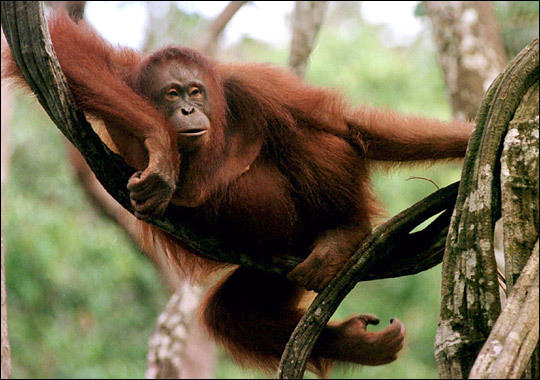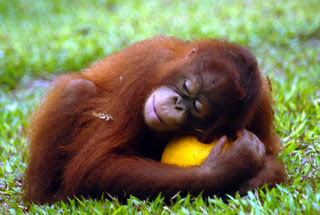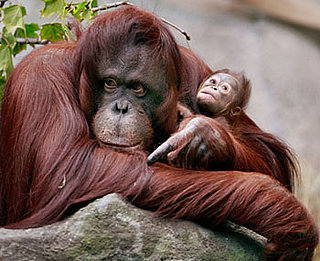Orangutan is the largest tree-dwelling animal in the world with the largest males capable of growing to a height of more than 5 feet and weighing more than 200 pounds. Females are normally much smaller than the males where the matured females can grow to a height of about 4 feet and weigh about half of the males. Most of their times are spent living on top of tree branches and swinging from tree to tree where they get their food and other needs. Although they have strong legs, it is not very often use for walking as they seldom come down to the ground to avoid being prey to predators such as tigers, leopards and snakes. Since they need to spend most of their time on top of trees, they have developed long and powerful arms and legs to enable them to swing from branches to branches with ease. They also have a hook-shaped fingers and toes so that they can easily hang and swing on the tree branches.
Orangutans are omnivores but their favorite diets are mainly tropical fruits from the rainforest such as durian, jackfruit, mangoes and other fruits, which make up over 90% of their diet. Beside from fruits, they also eat other food such as leaves, tree shoots, honey, small insects, bird eggs and small animals such as birds. They are also known to eat tree bark and soil or rock that is rich in minerals. Orangutans are considered as loners who like to keep to themselves as much as possible. Adult of both sexes normally wander and travel alone. They are normally active during the day and spend much of their adult life alone and avoiding others of their own species. The exception to this is during feeding time where they will congregate to share the same fruiting tree, during mating and during the weaning period between a mother orangutan and her kid where they will be in close contact with each other for the first seven to eight years of the kid life.
Orangutans have a very similar genetic makeup to human with about 96.4% identical and they are an intelligent animal. Recent research has shown that the orangutans are more intelligent than the chimpanzees, which were previously thought to be the most intelligent creature in the animals' world. They are the only creature in the animal kingdom that can make and utilize a variety of simple tools to aid them in their everyday life. They make their own sleeping nest every night from tree branches, twigs and foliage. They also make tools for extracting insects from tree holes or cavity and can use seed-removal tools for extracting seeds from hard-skin fruit. Adults' orangutans are also known to teach their young the art of making tools and how to find food.
The future survival of orangutans in the wild will depend on human intervention, as they are likely to become extinct in the wild without our intervention and help. The governments of Borneo and Sumatra have taken the first step to ensure their survival by declaring large areas of rainforest as a forest reserve where logging and land clearing for plantations is prohibited. Wildlife protection laws are also in place to keep them safe from extinction. Many sanctuary and rehabilitation centers have been opened to treat and care for sick, injured or orphaned orangutans. These rehabilitated apes will then be released back into the tropical rainforest so that they will re-populate back the forests.











